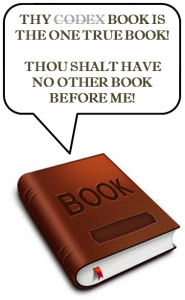 Remember a couple of weeks ago when codex fetishists were exuberant about a study they thought showed that reading e-books keeps you up at night?
Remember a couple of weeks ago when codex fetishists were exuberant about a study they thought showed that reading e-books keeps you up at night?
Except that the study really showed no such thing?
Well, they’re at it again. At the self-parodyingly named TreeHugger website, we see this little bit of propaganda:
E-readers are undeniably practical, but science has weighed in on the debate and come up with a surprisingly traditional conclusion… reading paper books has real benefits, supported by a number of studies, that e-readers simply cannot match, despite their undeniable practicality.
Readers absorb less on Kindles and iPads than when they read on paper.
According to a study from Norway’s Stavanger University, lead researcher Anne Mangen says: “The haptic and tactile feedback of a Kindle does not provide the same support for mental reconstruction of a story as a print pocket book does.”
When 72 Norwegian tenth-graders were given a text to read either as a PDF or as a printed document, followed by a comprehension test, the “students who read texts in print scored significantly better on the reading comprehension tests than students who read the texts digitally.”
The problem? That study “gave 72 Norwegian 10th-graders texts to read in print, or in PDF on a computer screen.”
We can presume, since most computer screens are light-emitting and no specific caveat was made, that these PDFs were read on a light-emitting screen. Light-emitting screen, as we’ve had to point out before, is not interchangeable with e-reader.
The e-reader-specific part of that Norwegian research tells a very different story:
Anne Mangen … thought academics might “find differences in the immersion facilitated by the device, in emotional responses” to the story. Her predictions were based on an earlier study comparing reading an upsetting short story on paper and on iPad. “In this study, we found that paper readers did report higher on measures having to do with empathy and transportation and immersion, and narrative coherence, than iPad readers,” said Mangen.
But instead, the performance was largely similar, except when it came to the timing of events in the story. “The Kindle readers performed significantly worse on the plot reconstruction measure, ie, [sic] when they were asked to place 14 events in the correct order.”
So, if all you care about is a chronological sequence, paper wins hands down. Otherwise, it’s a toss-up. What’s not a toss-up is that TreeHugger is grossly misrepresenting the research to support a pro-paper fetish. The reality is that, except for readers being able to recreate a character itinerary, the earlier results were not reproduced. The way science works, non-reproducible results are not results.
The lies, pseudoscience, and red herrings go on. Under the same “Readers absorb less on Kindles and iPads than when they read on paper” sub-header TreeHugger reports:
The Wall Street Journal reported a 2007 study of 100 people that found that multimedia presentations using a mixture of words, sounds, and moving images resulted in lower retention levels than when the audience read a plain text version, minus all the fancy so-called comprehension aids.
Remember the last e-book you read with lots of sounds and moving images? Of course not. I’m sure there’s some hipster writer out there trying to out-cool the rest of us with this technique, but in the real world what’s being compared in that study are typical hyper-text web documents and—as “plain text” implies—any type of regular book regardless of format.
To close, I’m just going to quote what I’ve said before:
I much prefer paper codices to e-books. I’ve never liked an e-book for which I didn’t subsequently purchase a codex copy for my shelves. I own thousands of paper books; I tried e-books for a year or so and found I didn’t like them.
But, I’m not a codex fetishist like so many knee-jerk e-book haters today.
It would be nice if codex fetishists would just recognize their preference as being merely a preference, drop the ignorant and supremacist bigotry, and stop corrupting science while beating their war drums.

The many reasons e-book sales are slipping | J. Nelson Leith
January 22, 2015 at 1:16 pm
[…] dual-page reading and providing graphical margins that give a sense of the reader’s progress. As we’ve seen, features that enable readers to keep the sequence of text clear in their minds constitute the […]
Yet more lies from paper book fetishists | J. Nelson Leith
August 27, 2015 at 9:54 am
[…] the paper book habitually twists research into pseudoscience to slander ebooks as sleep-stealers, brain-numbers, and (ironically) out of fashion. It’s exhausting confronting these ignorant primitivists, […]